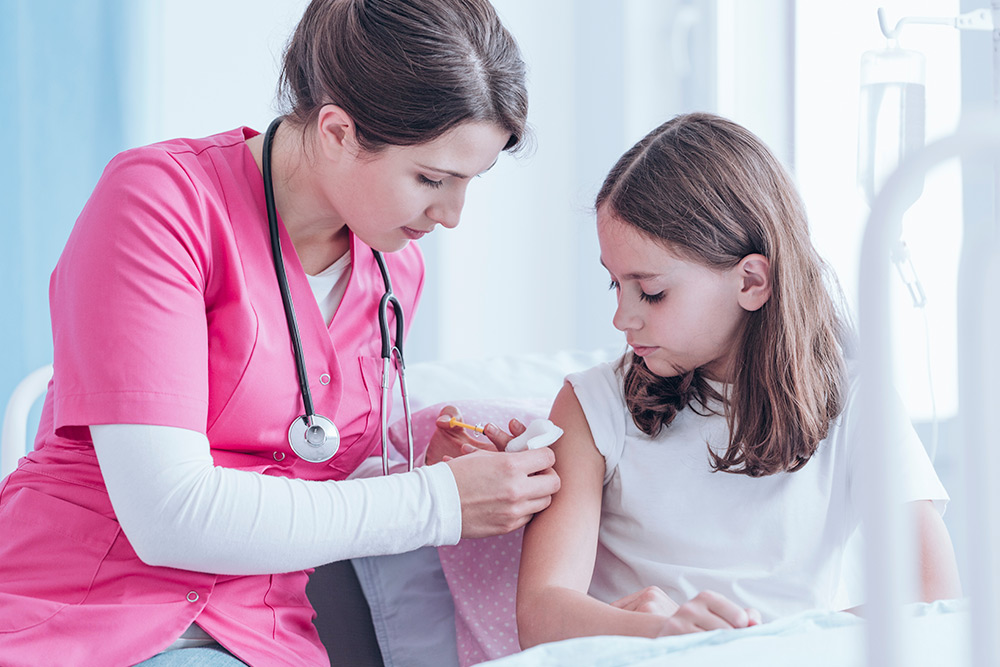
Recent cases of Measles in Tennessee, along with new outbreaks all over the United States, have many parents concerned about measles and their child’s vaccination status.
Most of the people who have gotten sick were not vaccinated against the measles. This is an important time to verify your child has their immunizations.
Here are some answers to questions we have heard in the office.
When do children needs to the vaccine?
Pediatricians, the American Academy of Pediatrics, and CDC recommend children get the MMR vaccine at 12-15 months and again at 4-6-years-old. Children can receive the second dose earlier if it is at least 28 days after the first dose. Vaccinating the community helps protect those who are too young to be vaccinated, including all infants less than 12 months old. These infants are the highest risk of serious illness, hospitalization, and death due to measles.
How long does the measles vaccine protect our children from measles?
The MMR vaccine is very effective protecting against measles, but no vaccination is 100%. Some people are at risk for getting measles if they have received 1 dose of the vaccine, which is why the recommendation was changed to 2 doses after 1989. The first dose of measles provides up to 94% protection against measles. The second dose of measles vaccine increases protection to closer to 99%.
I have read that we can get the vaccine as early as 6 months and get my child’s second dose one month after the first. In light of recent cases of measles, should my child receive an extra vaccine?
Currently, the cases of measles in Tennessee is not in our area. If an outbreak were to occur, the health department will advise us to vaccinate those as early as 6 months. We do not feel this is necessary now. If you are planning to travel internationally with your child or to an area with a current measles outbreak, we would recommend vaccination as early at 6 months. Please call the office if you have specific questions about this.
You may receive the second vaccination 28 days after the first dose of MMR. You will not need a second dose at 4-6 years old if you receive this dose. If you are traveling and have had a well visit within the last year and would like you child to receive this dose, please call the office to schedule a nurse visit. If you have not had a well visit, please call and make a well visit appointment and discuss with your pediatrician.
Do parents and grandparents need MMR vaccination?
Anyone born for 1957 is considered immune to measles, these individuals are considered protected for measles for life and no additional vaccination is necessary.
Those born after 1989 should have received two doses of MMR. Many of those who were in school in 1989 were given a second dose of MMR during that year. If you have had two doses of MMR, you are considered protected for life and do not need a booster dose.
If you do not know your immunization status against measles, you should first try to find your immunization records. If you do not have written documentation of measles immunity, you should get the MMR vaccine. There is no harm in getting another dose, even if you may already be immune to measles.
I thought measles was a rash or a mild illness. Why is everyone so worried about measles?
Measles was once a common childhood illness. Many children recovered from the measles without any problem. However, in some children the infection can cause pneumonia, encephalitis (an infection of the brain) and even death. As many as 1 out of every 20 kids with the measles got pneumonia, which is the most common cause of death from measles. Of every 1,000 children who got measles, one or two would die. Before the measles vaccine, an average of 450 people died from measles every year. The majority of these were healthy children. Measles can also cause an encephalitis (infection of the brain) that may progress over 6-8 years and ultimately lead to death.
Many people have questioned the safety of the measles vaccine over the past few years and that has caused a decrease in protection against the virus in our communities. There have been many outbreaks across the United States, with 2019 having the most measles cases in the US since measles was considered eliminated from the US 20 years ago. There have even been a few cases in Tennessee.
What are the symptoms of measles?
The most common symptoms of measles are a very high fever and red-brown blotchy rash. Before the rash appears, children develop cold-like symptoms: cough, runny nose, watery eyes. They continue to get worse after 1-3 days of illness.
Is the measles vaccine safe?
Yes. A vaccine, like any medicine, can cause side effects. Usually these side effects are very mild – like pain or swelling at the injection site, a fever that lasts for <48 hours. The risk of harm from the measles vaccine is very small. It is much safer than getting the measles infection.
There was a study done in England many years ago showing a possible link between the MMR vaccine and autism. The study was falsified and the author lost his medical license. Multiple studies have been done since then and have found no association between the MMR vaccine and autism.




